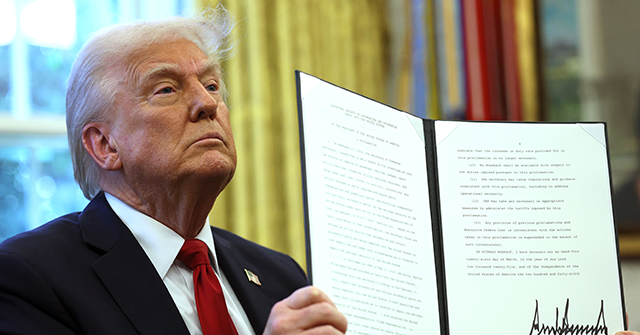Global Demand for Dollars Doesn’t Turn on Rates
In our previous column, we explained why the claim that tax cuts necessarily lead to higher interest rates—and thus trade deficits—is far from settled. But what about the next step in the argument: that a larger deficit leads to a stronger dollar, which then widens the trade gap? That link, too, doesn’t hold up.
Even if interest rates did rise in response to tax cuts the next step in Furman’s argument assumes that higher rates will necessarily strengthen the dollar. But here’s the problem: the dollar doesn’t move in lockstep with rates.
Economist Stephen Miran, in a paper written before he was elevated to head the Trump administration’s Council of Economic Advisors, contends that the strong global demand for dollar-denominated assets keeps the dollar’s value elevated, making U.S. exports less competitive and imports cheaper. That is to say, the dollar’s strength or weakness is not primarily a function of interest rates but of global demand for dollar savings.
Then there’s the view of economist Michael Pettis, who frames the problem in a similar way. Pettis argues that the U.S. trade deficit is not driven by budget policy but by global capital flows. Countries with persistent current account surpluses—Germany, China, Japan—have excess savings that must find a home. The U.S., as the world’s largest and safest capital market, is the natural destination. This capital inflow strengthens the dollar and suppresses U.S. exports—not because of domestic tax policy, but because of foreign mercantilism.
In Pettis’s model, the trade deficit is the price America pays for providing the rest of the world with a safe place to park its money. The budget deficit, meanwhile, is often a response to the demand shortfall created by that trade imbalance. It’s the reverse of Furman’s story: the trade deficit causes the budget deficit, not the other way around.
At the very least, exchange rates respond to dozens of competing forces, and fiscal expansion introduces at least as many dollar-negative pressures as dollar-positive ones. What’s more, a larger deficit can create expectations of future inflation or monetary easing. It can raise concerns about fiscal sustainability. It can lead investors to shift portfolios out of dollar assets if they believe the U.S. is becoming a less disciplined borrower. In those cases, the dollar could depreciate—and that would actually narrow the trade deficit by making U.S. goods more competitive abroad.
In fact, a 2008 study by Soyoung Kim—a professor of economics at Seoul National University and Nouriel Roubini—a former IMF economist and NYU professor—found just that: expansionary fiscal shocks in the U.S. were followed by real exchange rate depreciation—not appreciation. They called this pattern “twin divergence,” where the budget deficit rises while the trade deficit shrinks. That’s the opposite of what Furman predicts—and it’s what the data showed, repeatedly, over decades of U.S. economic history. In short, the real economy does not follow the Feldstein Chain. It occasionally breaks it.
The Myth of Tax Cuts Fueling Surging Imports
Furman also suggests that tax cuts will increase the trade deficit by giving Americans more money to spend on foreign goods—German cars, Chinese electronics, imported beer. We can call this addition to the “Twin Deficit” hypothesis the Furman Chain. But that only works if tax cuts actually translate into a surge in goods consumption. In reality, most of the U.S. economy is services, and so is most consumer spending.
When people get a tax cut, they don’t automatically go shopping for foreign-manufactured goods. They pay rent, dine out, visit the doctor, hire a tutor, or buy domestic services—none of which adds to the trade deficit. In fact, services make up over two-thirds of U.S. consumption, and most of those services aren’t imported at all.
This point is backed up by research from Michele Cavallo at the San Francisco Fed, who found that a one-percent-of-GDP increase in government spending worsens the current account by only about 0.15 percent. Why? Because so much of that spending flows into the non-tradable part of the economy—housing, healthcare, education, public safety—not into imported goods.
And don’t forget that Trump is raising tariffs on imported goods. Those will likely dampen demand for imports and may push up some prices of imported goods. That makes it even less likely that the tax cut will fuel a spending spree on imports.
So, Furman’s imagery of tax cuts fueling a shopping spree for foreign goods is misleading. The bulk of increased demand is likely to land in domestic service sectors, blunting the pass-through to imports and weakening the link between tax cuts and trade deficits.
What That Means for Trump’s Tax Cuts
None of this means we should ignore deficits. But Furman’s concern—that Trump’s tax policy will lead to both a wider budget gap and a larger trade deficit—rests on a model that hasn’t held up well to scrutiny.
Tax cuts don’t necessarily crowd out private investment. They don’t necessarily strengthen the dollar. And they certainly don’t guarantee a worsening of the trade balance. As we noted yesterday, the relationship between budget and trade deficits is conditional, variable, and often weak. Sometimes it even runs in the opposite direction.
So, when Trump calls for tax cuts to boost American growth, we can debate their fiscal merits; but let’s not pretend they’re a guaranteed path to trade imbalance. The theory behind that claim is old, contested, and, in many cases, simply wrong.
Read the full article here
